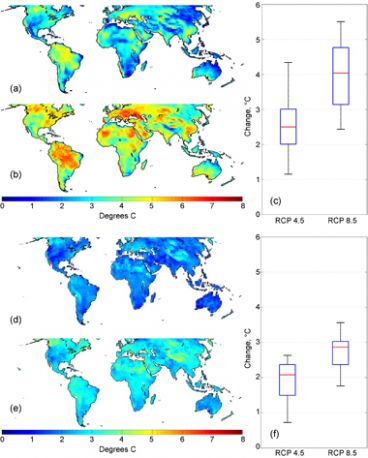
A new study conducted by researchers at the Newcastle University has revealed that climate change will bring chaos to Europe by 2051. Using available climatic models, experts have predicted the possibility of heatwaves, drought, and floods in almost all European cities. The chances of drought are very high in Southern Europe, while river floods are to hit the north-western European cities including London, they predicted.
Earlier, the Intergovernmental Panel on Climate Change (IPCC) had predicted an average global temperature rise of 2.6 to 4.8 degree Celsius by 2051. Using the prediction, experts at the Newcastle University showed results for three possible future impacts which they call high, medium and low.
In the high scenario, most of the cities in the United Kingdom with a river will face flooding by 2051. The researchers revealed that half of the cities in the UK could witness at least 50 percent rise in peak river flows. According to the researchers, cities which will be worst hit by floods include Glasgow, Waterford, Wrexham, Carlisle, Cork, and Derry. In low impact scenario, cities like Newcastle, Carlisle, Glasgow, Derry, Aberdeen, and Chester will face floods.
The European capitals which will be drastically affected by floods are Dublin, Helsinki, Riga, Vilnius and Zagreb.
On the other hand, cities in the south of Iberia, such as Malaga and Almeria will face droughts by 2051, and this comes under the low impact scenario. If it is a high impact scenario, 98 percent of the European cities will face severe drought.
Even in the most optimistic scenario, scientists predict an increased rise in heatwaves in all the European countries. During the time of heat waves, Southern Europe will be hit worse, while Central European countries will witness a drastic rise in temperatures due to heat waves.Lisbon and Madrid are the top capital cities which may face intense heat waves in the coming years, while capital cities like Athens, Nicosia, Valleta and Sofia will face worse effects of drought and temperature rise.
In the low impact scenario, the temperature in Central European countries will rise by 2 degree Celsius to 7 degree Celsius, while the temperature rise will be 08 degree Celsius to 14 degree Celsius in the high scenario.
"Although southern European regions are adapted to cope with droughts, this level of change could be beyond the breaking point. Furthermore, most cities have considerable changes in more than one hazard which highlights the substantial challenge cities face in managing climate risks," said Dr Selma Guerreiro, lead author of the study.
The research report, published in the journal Environmental Research Letters, also highlights the vitality of designing European cities to cope with these extreme climates in the future.








